Croatia Commemorates 26th Anniversary of Operation Flash
ZAGREB, 1 May 2021 - Croatia today commemorates a combined military and police operation, dubbed Operation Flash, by which it regained control of the Serb-occupied Western Slavonia region during the Homeland War 26 years ago.
In a lightning offensive launched on 1 May 1995, in less than 32 hours about 7,200 Croatian soldiers and police officers liberated about 600 square kilometers of the Croatian territory that had been under occupation for four years.
The commemoration began in the morning at the monument in Okučani, about 130 kilometers southeast of Zagreb, with the reading of the names of those killed in the operation.
Wreaths were laid by President Zoran Milanović, Parliament Speaker Gordan Jandroković, Prime Minister Andrej Plenković, and their delegations as well as by delegations of veterans' associations and families of those killed.
For more about the homeland war in Croatia, follow TCN's dedicated page.
Croatia Seeks Two Suspects Involved in 1991 Killings of Civilians
ZAGREB, 28 April, 2021 - An international arrest warrant has been issued for a 78-year old Croatian citizen Dragan Bešir and 79-year old Serbian national Slobodan Đorđević for murders committed in 1991 and shelling a refugee camp in Grabovac where a three-month old baby was killed.
The charges have been forwarded to the County State Attorney in Rijeka after Lika-Senj and Karlovac county police authorities in cooperation with prosecutorial authorities completed the criminal investigation, the police has reported without revealing the identity of the two suspects.
The suspects are out of reach of Croatian judicial authorities. They are charged with failing to prevent the murder of civilians between 8 October and 10 November 1991 and in that way violated international laws during war conflicts.
Both Bešir and Đorđević were commanders of the then Yugoslav People's Army (JNA), and they did not do anything to prevent the murder of 35 civilians.
In addition, Đorđević is charged with not preventing a mortar attack on a refugee camp at Grabovac which resulted in the killing of three civilians including a three-month old baby, who was the youngest victim during the Homeland War.
Friends of Croatia: New TCN Series On All Things Diplomatic
April 20, 2021 - Check out the newest TCN series "Friends of Croatia", dealing with all things diplomatic, by TCN reporter Ivor Kruljac
December 22, 1990, the Croatian parliament known as Sabor brought its first independent constitution, known as „The Christmas Constitution“. After that, the same parliament officially declared Croatia as an independent country and no longer part of the Socialist Federal Republic of Yugoslavia on June 25, 1991. Then followed the Ex-Yu War known in Croatia as a Homeland War, which lasted until 1995.
While this war is one of the foundations of Croatian independence, noted by the modern constitution as well as on other grounds of historic events, the dedication of soldiers, tactics, weapons, force and combat skills weren't the only cards Croatia had to achieve its sovereignty. It was also the communication with the international community and international recognition. This allowed Croatian citizens to not end up in the trap of Transnistria, a sovereign state officially recognized as part of Moldova, where Moldova does not rule due to the army and force monopoly by the Transnistrian government, but whose passports have no benefit for its citizens and despite being a state, in official maps does not exist.
Iceland was the first sovereign country to recognize Croatia as a sovereign state on December 19, 1991, followed by Germany in whose recognition took effect on January 15, 1992. Slovenia technically did recognise Croatia first, the same as Croatia was the first to recognise Slovenia, but neither country had international recognition at the time, which is the reason Iceland counts first. Floored by Iceland and Germany, other countries started to recognize Croatia and the new-found Republic joined the UN on May 22, 1992. The international status was then additionally boosted with joining Nato on April 1, 2009, and the EU on July 1, 2013.
Today, Croatia has 176 diplomatic relations; and for TCN writers, reporting on diplomacy is nothing new. Diplomatic relations can be viewed, in layman terms, like friendships, and this is why this series is called „Friends of Croatia“. As stated by the E-International relations site, diplomacy has existed as long as the human race. It can be viewed in the first negotiations amongst individuals before graduating to the level we know today.
„Among the many functions of diplomacy, some include preventing war and violence and fortifying relations between two nations. Diplomacy is most importantly used to complete a specific agenda. Therefore without diplomacy, much of the world’s affairs would be abolished, international organizations would not exist, and above all, the world would be in a constant state of war. It is for diplomacy that certain countries can exist in harmony“, writes the E-International relations site.
And indeed, shutting down diplomatic relations is a final step before potential war escalation and the spread of violence. Even with certain diplomatic tensions, Croatia has with Slovenia around Piranski Bay, or with Serbia regarding uncleared questions from the Homeland War, the fact there are diplomatic relations both with Serbia and Slovenia ensures that these tensions can be solved by peace and not violence.
But what exactly are the details of Croatian diplomatic relations with other countries and international organizations? This is precisely what this series strives to bring by explaining the history of Croatian diplomatic relations by talking to diplomats, embassies, and representers of international communities, with an informative, unique approach to each specific relation. The series wants to inform of the ups and downs of Croatian international collaboration, how to make them better, what benefits are there in these relations for Croatia, and what benefits are there for other countries. Keep your eyes open for articles in these series with more details and interesting facts about diplomacy in general too.
If you are working in the embassy or in an international organization in Croatia, feel free to reach out to This email address is being protected from spambots. You need JavaScript enabled to view it..
To read more from the series "Friends of Croatia", follow TCN's dedicated page.
For more about politics in Croatia, follow TCN's dedicated page.
President Zoran Milanović Decorates Participants in 1991's Operation Plitvice
ZAGREB, 30 March, 2021- President Zoran Milanović, acting in his capacity as Commander in Chief of the Croatian Armed Forces, on Tuesday decorated participants in 1991's Operation Plitvice, describing them as heroes to whom Croatians owe lasting gratitude.
Milanović presented the decorations at a formal reception in his office, on the occasion of the 30th anniversary of the operation and in memory of Josip Jović, the first Croatian police officer killed in the 1991-95 Homeland War.
Jović, 22, was killed and nine other police officers were wounded in a police operation on 31 March 1991 after Serb insurgents occupied the Plitvice Lakes National Park and blocked the D1 state road that connects the country's north and south. Jović was a member of the Lučko Anti-Terrorist Unit.
Addressing the participants in the operation, Milanović said that as the Commander in Chief he would pursue a non-partisan policy.
"A policy that does not recognise either of the two big parties or third parties, a policy that recognises only our interests. And for Croatia and us Croatians to be able to define and realise those interests, the state had to be defended and created first. Without you, none of that would have been possible. May the memory of Josip Jović live, to you we owe our gratitude. Long live Croatia!" Milanović said in his address.
In a statement to reporters after the reception, Milanović noted that no government representative attended the event.
For more about war in Croatia, follow TCN's dedicated page.
Man Arrested for Murder of Seven Vukovar Civilians during 1990s War
ZAGREB, 19 March, 2021 - A 50-year-old man has been taken into custody following an extensive operation by the police, state attorney and the security-intelligence agency (SOA) on the suspicion of torturing and killing seven Vukovar civilians during the Homeland War in September 1991.
The suspect and members of his paramilitary unit are believed to have punched, kicked and hit with their rifle butts a group of seven civilians, aged between 24 and 55, whom they found in the basement of a house in Vukovar.
The perpetrators then led the captured civilians to the city centre, killing six on the way, while a 55-year-old prisoner was wounded.
After that, the suspect and the other paramilitaries returned to the house and collected the women and children staying there whom they also wanted to take to the city centre but were stopped by an unidentified Serb army officer. The women and children and the wounded 55-year-old man were returned to the basement, however, the next day the 55-year-old was killed by an unidentified Serb paramilitary.
The police reported that after the reintegration of the Danube region an exhumation was conducted and six of the murdered civilians were identified. A 27-year-old man from that group is still unaccounted for.
The suspect was taken into custody while the Osijek County Attorney's office has filed criminal charges against him for war crimes against civilians.
For more about the war in Croatia, follow TCN's dedicated page.
Parliament Committee Endorses Bill on Civilian War Victims
ZAGREB, 16 March, 2021 - The parliamentary committee on human and national minority rights on Tuesday endorsed a bill on civilian Homeland War victims, whose rights are currently regulated by a law from 1992 which, despite having been amended 12 times, does not cover all civilian victims.
Under the bill, the rights can be exercised by Croatian as well as foreign nationals, provided they were Croatia's residents during the 1991-95 war. It is estimated that the bill will apply to 2,500 more beneficiaries.
Among other things, the bill facilitates eligibility for the family disability allowance and increases the individual disability allowance.
Committee chair Milorad Pupovac (Independent Democratic Serb Party) said it was important that the bill covered all Homeland War victims and that it should define collaborators more precisely.
For more about politics in Croatia, follow TCN's dedicated page.
Croatian Radiotelevision Story from 1998 Tells the Tale of Reconstruction of Strašnik
January 6, 2021 – A Facebook post started making the rounds in Croatia today, where archival footage from the village of Strašnik in 1998 is shown, where the concerns about the quality of the construction work after the Homeland war is questioned.
You can see the video in question below:
The video is from an extremely popular Croatian Radiotelevision show called “The Fruits of the Land” (Plodovi zemlje), which is the longest-running TV show on national television – it has been continuously broadcast since 1958. In the Nineties, the show was hosted by the extremely popular host Ivo Lončar, who has since passed away, but who produced the segment in question.
In the introduction to the segment, we are briefly told the story of Strašnik village, which is a village most people in Croatia had not really heard of before December 29th, 2020, when it was the epicentre of the disastrous earthquake. During the Homeland war of the early Nineties in Croatia, the occupying forces burned most of the homes in the village and forced the (mostly Croatian) people living there to flee their homes. After the success of Operation Storm in August of 1995, and in the spring of 1996, the return of the villagers began. Unfortunately, Ivo Lončar says in the piece, the return was not as efficient as was promised to them – as evidenced by the fact that out of the 400 people living in the village before 1991, only about a hundred of them returned before 1998, when the segment was produced. Before the war, most of those 400 people lived mostly off the land, most of them had cows and sold milk.
The people of Strašnik told the story of the state-funded and managed project of the reconstruction of their homes, stressing that the project started off on the wrong foot. The construction work itself was performed by the Krs company (the segment says it’s from Zagreb, but other sources say that the company was from Osijek), and the oversight was performed by the Sirać company. Back in 1998, when the segment was made, the people of the village told the reporter that the quality of the work performed was extremely low, This was at the moment when more than 70% of the houses in the village has been completed. 30 percent of the homes were never rebuilt, and the electricity was re-installed in the village in 1998, two years after the beginning of the project.
The people of the village publicly accused the head engineer, who led the project of rebuilding the homes in Strašnik, of open corruption. A villager (Stjepan Prašnjak from the local administration) explains to the reporter that they had come in contact with him personally and tried explaining to him that many odd things were happening during the construction phase, including the example in which the entire foundation of a house was built using 5 sacks of concrete. The same person also told the story of a villager who had returned to their home, went to sleep during the night and was awakened by the sounds of something breaking, crashing, only to discover that his chimney was crashing down!
Mr. Prašnjak then explained that the people of the village had tried complaining to numerous instances, both on the local, county level, and also on the national level through the Ministry in charge of the reconstruction of Croatia after the war. The replies they received were mostly that the problems will be fixed on the field, and that the company performing the construction work would have to foot the bill for any irregularities. Back in 1998, he added that nothing has been done to fix any problems.
The reporter continued to explain that the low-quality materials were used in the construction (concrete, brick, iron, roofing tiles), and the work performed was also bad. To prove the inferior quality of the work, the fact that in the first winter after the work was completed, in 1996, when the first snow came, 5 or 6 chimneys came down on their own, plaster started coming down on various houses etc. The windows and the doors were of very low quality, as well as plumbing and electricity installations. Ivo Lončar said outright that the reconstruction of the houses was plagued by the smuggling of the construction materials. Stjepan Prašnjak adds that the person who was in the village representing the company took bribes from the villagers, stating that there are witnesses who can corroborate that.
Most of the houses and the outbuildings were reconstructed by the villagers themselves, who invested their own funds into that. They felt bitter that they weren’t supported by the state more in that. The segment continued to explain the economic situation in the village, where there was only one tractor in 1998, and they were not given any financial support for the planting season.
Ivica Perković from the village told the story of his return to the village, which took place in 1998. First of all, he complained about the state of his house and said that it was impossible to return if you don’t have a house. He continued to say that both the speed and the quality of the reconstruction was not satisfactory. To prove his point, he stated that the works on his house had started in 1996, and that they were still not finished in 1998. He had complained about that fact to the Ministry, who responded to his complaints, but nothing had changed. He then explained that he had 5 cows, which he got milk from for sale, and some pigs, and that agriculture was the only way to make their living in the village.
Nikola Starešinović from the village told his story later in the segment, where he explained how, after his house had been rebuilt, it was discovered that the foundation of his new home had not been done properly. The foundation of his house was crumbling away (you can see that yourself around the 9:30 mark of the segment). He had complained about that to the institutions in charge, and the overseer came to his house and issued the recommendation of what needed to be done to fix the problem – and it was never done! He explained that he had no idea who else to complain to, to have his house fixed properly. He then continued to explain his life as a new farmer in the region.
Josip Šubić told the example of a house which had supposedly been reconstructed, where the water installations and the water heater had been installed, while at the same time the house didn’t have the doors or the windows. He added that when the people in charge of the oversight arrive in the village, they kept saying that the work is doing great.
The segment finishes on a very pessimistic note, with a villager saying that he regretted returning to the village and that he understood why young people were not coming back. The other one explained how and why people of the village were disappointed. Ivica Perković tried to give an optimistic view of the situation, saying that he loved the village and that more and more people were returning to it.
Ivo Lončar concluded the segment by stating that the reconstruction in Strašnik was officially finished, that the workers and the machinery had left the village. What remained were unfinished houses, even those finished are of low quality, people were sad and disappointed, the outhouses were never built by the state, there is no production of anything in the village, and he asks for how much longer the people of Strašnik need to suffer.
In 2021, the only thing we can say is – unfortunately, their suffering is far from over.
For more on the Petrinja earthquake and to see how you can donate money, food, humanitarian, sanitary, and material aid, follow our dedicated section.
VIDEO + PHOTOS: Vukovar Tower Opens In Spectacular Ceremony
October 30, 2020 - Fireworks pierced the sky, music filled the air and a striking choreography of colours lit the Vukovar Tower at this evening's grand unveiling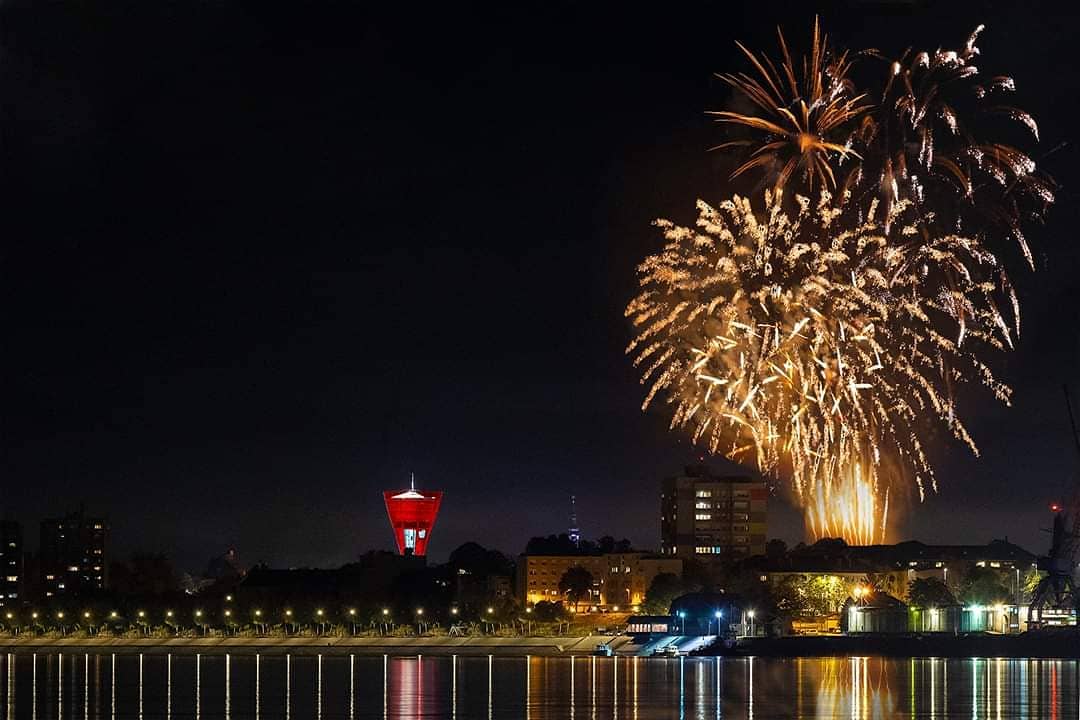
© Marko Džavić
Fireworks pierced the night sky, music filled the air and a striking choreography of colours lit the monument at this evening's official unveiling of the renovated Vukovar Tower. In a well-measured and memorable ceremony, the chill of the autumnal early evening was replaced with a myriad of heartfelt emotions.
One of the most recognised symbols of remembrance of Croatia's Homeland War, the Vukovar Tower has been under renovation for three years. Famously damaged in fighting during the war, its scars are a constant reminder of the heavy bombardment the town received. The Vukovar tower has undergone renovation needed to ensure its survival and to open up the structure to public visitation. Around 46 million kuna has been spent on the project, with much of the money coming from public donations.
Fireworks, as seen from spectators on the ground
Music at the opening ceremony ranged from solemn ballads delivered by Croatian pop stars, several all-male choirs and the traditional tamburaci folk music of Slavonia. The ceremony was broadcast live on the web pages of the City of Vukovar and on local TV channels.
The full hour-long ceremony
The Vukovar tower was built in 1968 and stands 50 metres high. It is difficult to judge its size from pictures, but at the time it was built, the structure was one of the largest water towers in Europe. In the times before the war, it held a restaurant with a panoramic view of the town and the surrounding Slavonian countryside. During the war, the Vukovar Tower was hit with more than 600 missiles. It thereafter became a symbol of resistance, then of remembrance.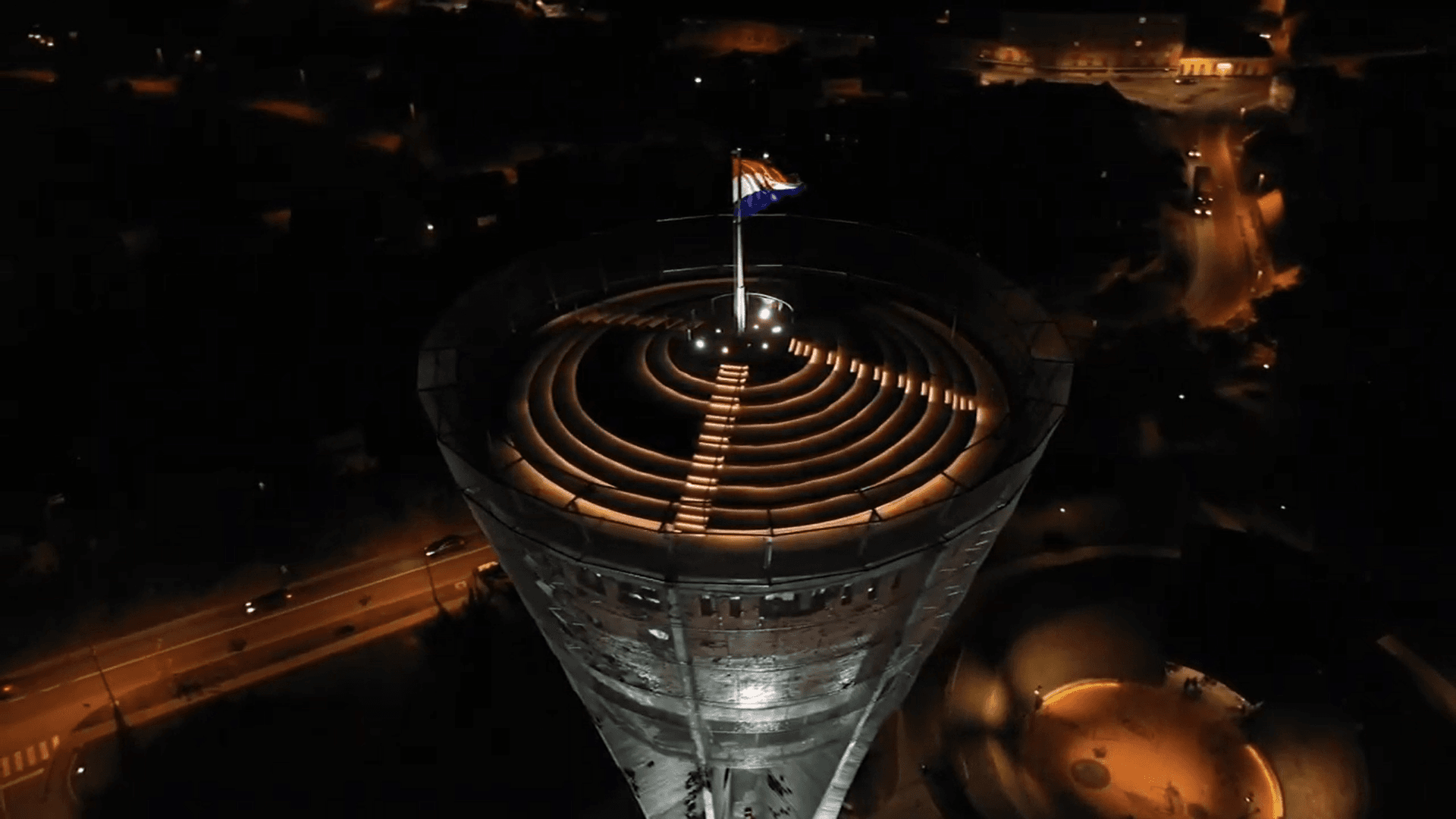
An integral part of the monument, the scars on the tower have been preserved in the renovation but shored up so that the Vukovar Tower can stand indefinitely. A new memorial space within the tower was presented as part of the unveiling. The monument will hereafter become part of Vukovar's most-visited buildings. Tens of thousands of Croatians visit Vukovar each year. Its art, culture and beautiful nature draw many, but large numbers also make the trip in remembrance of the war and the lives lost in the town. Almost every Croatian school year will make an organised trip to the town for this purpose.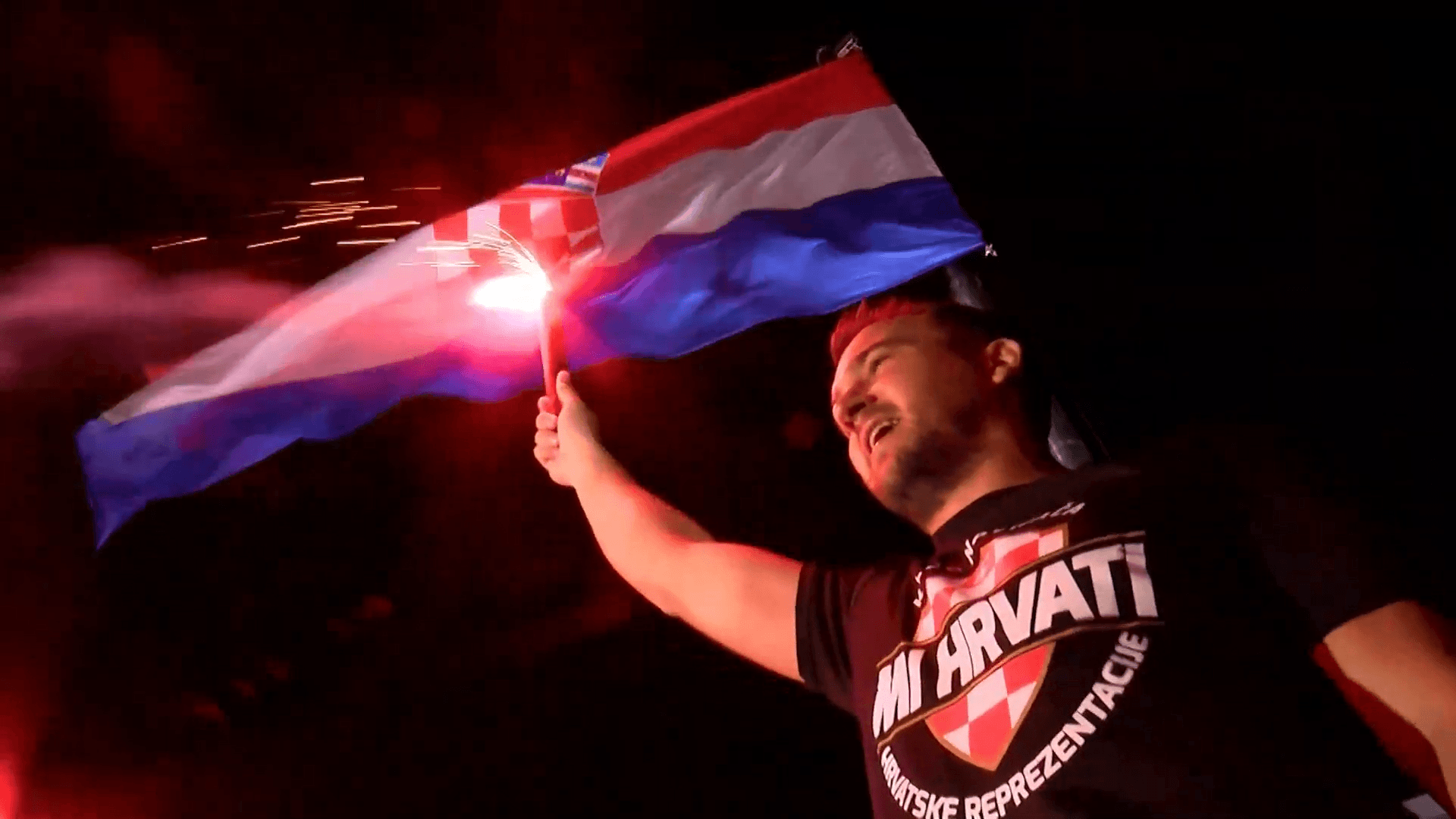 All uncredited photos © Grad Vukovar
All uncredited photos © Grad Vukovar
For the latest travel info, bookmark our main travel info article, which is updated daily.
Read the Croatian Travel Update in your language - now available in 24 languages
Emotive New Vukovar Father And Son Monument Unveiled
September 22, 2020 – Their lives taken in the Homeland War, Petar and Igor Kačić are depicted in the new Vukovar Father and Son monument. Igor was just 16-years-old at the time he was killed
During recent days, family members, the town mayor and veterans representatives attended the unveiling of a new Vukovar Father and Son monument. The statue is the work of Zvonimir Orčić and Josip Cvrtila and was commissioned in remembrance of Petar Kačić and his son Igor. Aged just 16-years-old at the time of his execution, Igor is the youngest victim of the massacre at Vukovar.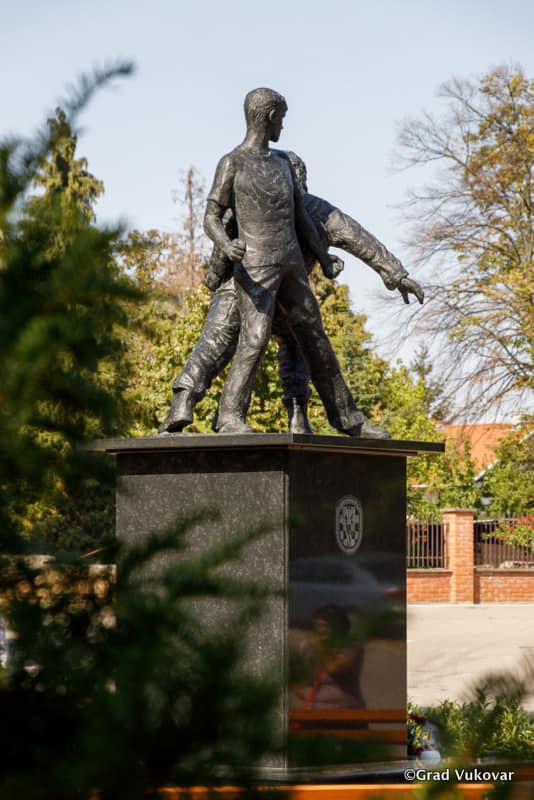
Petar Kačić was killed on the front line of the fighting in Vukovar on 2nd October 1991. He and other town residents were trying to defend their families and neighbours from the approaching Yugoslavian National Army forces. They were hopelessly outnumbered and inadequately armed for the task. They faced one of Europe's then-largest and best-equipped armies, whose numbers were bolstered by savage and ruthless paramilitaries.
Although the new Vukovar Father and Son monument shows the two males of the family together in defence of the town, Igor was actually killed one month after his father's passing, on 20 November 1991. While still grieving for Petar, the family had been moved into a shelter at Vukovar hospital to escape the intense shelling that rained down on the town each day. It had already destroyed their home two months previously.
Following the fall of the town, all refugees from the fighting were taken into the custody of the Yugoslavian National Army and their paramilitary accomplices. In a barbaric act that was to be repeated time and time again during the violent break up of Yugoslavia, the men were separated from the women, and small children, and then taken away.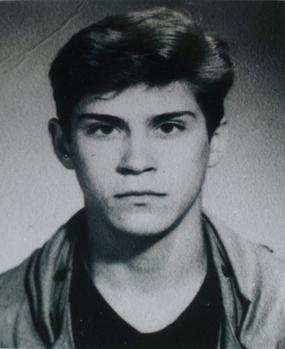 Igor Kačić, aged 16
Igor Kačić, aged 16
Although only 16-years-old, Igor Kačić was a strong and muscular boy. The look on his face was perhaps nearer that of a man, aged by grief, relentless shelling and the new responsibilities he had taken upon himself. After his father had been killed, Igor assumed the role of the family protector and stood on watch at the hospital while his mother Irena and his two sisters slept inside.
Around 300 men were taken from the Vukovar Hospital. Their number contained not only wounded fighters but sheltering civilians like Igor. They were transported by the Yugoslavian National Army to a farm in a hamlet called Ovčara, south-west of Vukovar. The army drove away, leaving the prisoners in the custody of the Serbian paramilitaries. 260 prisoners were lined up in groups, then shot. The bodies of 200 were later found in one mass grave.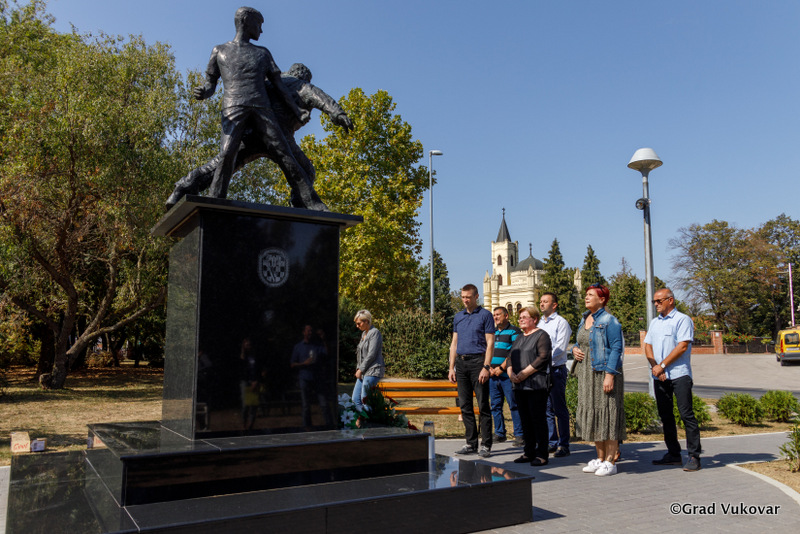
“It is not just a monument to Petar and Igor, it is a monument to all fathers and sons who gave their lives in the Homeland War,” said Igor's mother, Irena Kačić, at the statue's unveiling. Aged 69 years old, Irena Kačić had made the journey from her present-day home in Rijeka to attend the ceremony for the new Vukovar Father and Son monument.
All photos © Grad Vukovar / public domain
For the latest travel info, bookmark our main travel info article, which is updated daily.
Read the Croatian Travel Update in your language - now available in 24 languages
Bozinovic: Dalj Commemoration Shows Firmness of Those Who Defended Country
ZAGREB, Aug 1, 2020 - Deputy Prime Minister Davor Bozinovic on Saturday attended the 29th annual commemoration for the defenders of Dalj, saying their deaths were a tragic but proud moment of the Homeland War which showed the firmness of those who defended their country with the strength of heart and true patriotism.
He said that "in 1991, before the formation of the Croatian army, police forces played a very significant part in resisting the enemy."
"The police officers of this station were helped by members of the National Guard Corps, Civil Protection and the people of Dalj," Bozinovic said, adding that one tank shell fired today in 1991 killed 20 police, 15 guards and four Civil Protection members.
"But they didn't think that the atrocity they committed here would be one of the decisive events for raising the morale of the Croatian people in defending and liberating their country."
We should be proud of the Croatian courage, perseverance and strength of unity because this tragedy determined the further course of the Homeland War, Bozinovic said.
The defence of the Dalj police station was one in a series of confirmations of the dedication of the Croatian police to the enforcement of the law and the preservation of the constitutional and legal order, democratic values and the integrity of our country, he added.
Wreaths were laid outside the police station and Mass was celebrated for the victims at the Dalj church.
Reporters asked Bozinovic, who also serves as interior minister, about war crimes investigations and the war missing.
He said the investigations and the search for the missing was a priority of the government, the relevant ministries and other institutions. "There is intensive inter-departmental cooperation which has already delivered results and I'm sure it will do so in the future as well. When it comes to Dalj, criminal complaints have been filed and they are being processed."
Honouring all innocent war victims is a civilisational achievement
Bozinovic was asked to comment on Homeland Movement MP Ivan Penava's statement that this year's Grubori commemoration was a political trade-off and equating the 1995 Operation Storm and individual crimes.
He said the government had been continuously working on building political relations in Croatia.
"A responsible policy should create conditions so that we can turn to future challenges as successfully and with as little baggage from the past as possible. Talking about equating is groundless. The Storm anniversary is one of the most important dates in Croatia and will remain so, so one can't talk about any equating, nor is it appropriate to talk about that in that way. Honouring all war victims is a civilisational achievement."


